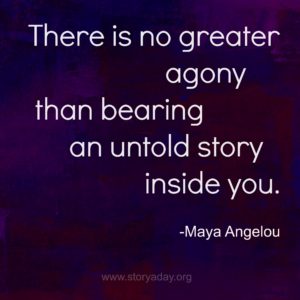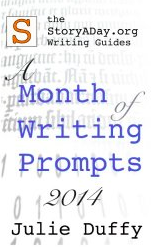So far this week we’ve talked about How To Decide What To Write and How To Justify Your Writing Time (To Your Friends and To Yourself).
Now that you’re all keyed up to write, we turn to the tricky question of how to take all your good ideas and turn them into story drafts.

From Idea To Story
Ideas are great.
Story Sparks are great.
Writing prompts can be great.
But anyone can have an idea.
It takes a writer to develop and idea and turn it into a story. Yeah, uh, how do we do that, then?
The Right Way To Write A Short Story
There is no one right way to write a short story.
That’s the beauty of the short story. It can be anything from a classic three-act narrative to a loosely connected collection of nouns verbs and prepositions.
There are as many ways to write a short story as there are writers. The only right way to write a story is to tell it the way you want to tell it.
Writing a short story that readers want to read, however, is a little more limiting.
1. Play With Structure
Short stories don’t have to follow a particular structure. With a short story you can forget about plot diagrams and character arcs and still end up with a satisfying story.
Why? Because short stories exist to immerse a reader in a moment in a character’s life. Or to make them question an assumption by illustrating its absurdity in miniature.
A list can be a short story. A diary entry can be a short story. A tweet can be a short story. But none of them work without the active participation of the reader.
Think about it: in writing short stories, you have to leave a lot out. You can’t spend a lot of time describing the six layers of undergarments worn by ladies of the court, the way you can in a novel. You can’t give much (any) backstory. You can imply, hint and leave spaces.
It’s up to the reader to slow down, pay attention and supply those details. In that way, the short story is a lot like poetry. Even as you play with the structure you must write for the reader.
2. Write For Readers
I don’t mean ‘write for acquisition editors and publishers’. I mean write for your ideal reader.
Readers expect certain things in a story. They expect setting and character and something to happen. Depending on your reader’s preference and tolerance level, they may expect suspense (or not), character development (or not), and a resolution of sorts (or not).
Literary fiction can get away with more of those ‘or not’s than genre and mainstream fiction. Mainstream readers tend to be looking for a less intense escape from reality than literary readers who are willing to study every line as if there’ll be a test on Friday (which they intend to ace.)
But it’s OK for even mainstream or genres readers to expect their readers to participate in the story.
What Do You Mean, Readers Have To Participate?
Read this oft-cited example of the shortest-short story:
For sale: baby shoes, never worn.
So what? On one hand, it’s just a classified ad. But if you, the reader really start to think about it, you start filling in the details: why the shoes were never worn; who might have placed the ad; and inevitably, how they must have felt, doing so.
You, the reader, are telling the story in cooperation with the author.
This is a pretty extreme version, of course. But you should be aiming for the same effect in every story you write, no matter its shape or length.
I’ve been hosting StoryADay since 2010 and I’ve read a lot of stories in that time. The stories that immerse me in a character or a world or a moment are the ones that stay with me. The stories that ask a question and make me care about the answer (whether or not they supply it) are the ones I seek out and re-read.
So how do you take an idea (either from your own head or from a writing prompt, or from some combination of the two) and make readers keep wondering about it long after they’ve stopped reading the words on the screen?
3. Ask Questions
If you start with in idea about a particular character or setting, next ask yourself “who cares?”. Who will be interested about a story about that character or setting?
Then ask “why”? What makes this situation different? What makes this person interesting?
For example, The Care And Feeding of Plants by Art Taylor, opens with two people who are having an affair, one is married, the other is not. Ho-hum, right? Except that “During one of their trysts…Robert told Felicia to bring her husband over for a Friday night cook-out.” Wait, what? DURING? What kind of people are these? I don’t know about you but I had to keep reading!
Next take your idea and ask yourself “if…then” questions.
In the example above the author might have asked himself: if the husband does come over, what could happen? If the wife refuses to invite him, then what happens? If the lover changes his mind, then what? Follow this line of reasoning down its most interesting, tangled alleys and see what you can come up with. (If you’re like me you’ll need to start writing round about now, because you’ll be too excited not to!)
4. Leave Gaps
Not literally (though maybe, depending on your story). But leave gaps, as in the six word short story above, and readers will start to ask the questions you leave lying around for them to find.
It might not be necessary to tell readers in the first sentence why your character is standing on a bridge, wind whipping her hair around her tear-stained face, one hand on the thin guide rail behind her. Just put her there and then make us care. You can supply the reasons (or not) later.
You might not need to walk through your character’s entire day to make poignant the moment when they walk through the front door of their home, mussed-up and frazzled.
Think about the minimum amount of information you can give the reader in order to pull them in, and keep them interested, yet still give them room to search for clues in the context as to what’s really going on in the story.
In “Orange” by Neil Gaiman, the entire story is told as a set of responses to questions that the reader never hears. Bob Newhart did a series of comedy sketches based on a one-sided phone call (https://www.youtube.com/watch?v=WnO1lnPH3BQ). He never tells us what happens at 1:41, but I’ll bet you, along with the laughing audience, can guess. You can replicate these ideas or you can use them to remind yourself to leave some things unsaid in your stories, to draw the reader in.
5. Try Something New
If you always write narrative stories with a character encountering an obstacle that clashes with their desires/needs, take a break. Try something different. Instead, write a story made up only of dialogue, or in the form of a memo to the staff, or a series of social-media posts or voicemails.
Challenge yourself to create complete characters or illustrate an absurdity, without talking directly to the reader.
As you write, keep asking ‘what if’ and ‘so what’ questions of your ideas.
6. Getting Unstuck
There’s a point, somewhere in the middle of every story, where it’s very easy to get stuck.
You’ve set up the characters and the situation, but now you’re starting to get tired and the thought of fighting your way to the end (with all the digressions that crop up as you think of objections and things you’ve left out, and things you want to explain) is just too much to bear. (A bit like that sentence.)
At this point, we go back to the questions.
If you don’t know what should happen next, ask yourself: what does your character want? What is standing in her way? How can you make it worse? What is she not prepared to do? Can you force her to do it? How can you resolve the reader’s question of “does she get what she wants” as quickly as possible?
If you’re really stuck, simply finish your sentence then write the words “But then” Finish that sentence and write: “And so” Finish that sentence. Repeat as necessary. You can edit out these phrases and clean up the prose in the rewrite (what else do you have to do in June?), but sometimes a crude, structural approach forms the foundation of a what turns out to be a strong story.
7. Keep Writing
If you are really stuck, the only thing to do is to write. Not brainstorm. Not diagram. Not sketch ideas. And certainly not turn to the next, bright shiny idea.
Write your way out of the problem and get to the end of the story.
It’s a short story. What do you have to lose? No one dies if you get it wrong. No one even needs to see it. But by finishing it, you will have learned so much more than if you give up.
I promise you, from bitter, joyful, exhausted experience, this is the truth.
Use the tactics in this article to blast past your fear, push through the mushy middle, and get to the end of today’s story. It might be a mess. It might be the foundation of something great. It might be a complete mistake.
But the biggest mistake of all is to stop writing.
Fear of making mistakes can itself become a huge mistake, one that prevents you from living.
-Rebecca Solnit, A Field Guide To Getting Lost
Tomorrow we talk about how the heck you keep doing this over and over again for 31 days in a row. With tips from past “winners” (Plus: how to be a winner even if you don’t write 31 stories)
At the end of this week I’ll be telling you about how you can get your hands onAvailable now a tool to help you sit down and write every day: the 2015 StoryADay Month of Writing Prompts ebook.
Want more articles like this?



